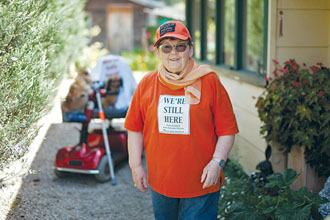FEDERAL politicians are about to get a colourful reminder that polio survivors still exist.
The disease was declared eradicated in Australia in 2000, but it has left a legacy of complex health issues for an ageing population of survivors.
Hastings resident Fran Henke is one of 46 people with post-polio syndrome going to Canberra next week to lobby politicians for more money to support Polio Australia.
They will be dressed in orange and have appointments to meet with MPs from their respective areas, in Mrs Henke’s case Flinders MP Greg Hunt and Dunkley MP Bruce Billson.
“There are hundreds of thousands of Australians in urgent need of support and specialised services to diagnose, treat and manage the complex and debilitating symptoms of the late effects of polio and post-polio syndrome,” Mrs Henke said.
“Government has been supportive of polio vaccination overseas, but has refused funding to Polio Australia annually since inception. Why? We are still here.
“The last thing any of us want is another person to go through what we have and then find it bounces back in later life.”
Mrs Henke said few doctors still practising were around for the acute phase of polio during the epidemics when children in callipers were a common sight in schools, “so are not on top of the late effects”.
“It can take six years to get a diagnosis of late effects of polio, so many wrong diagnoses have been made during that time, including fibromyalgia, chronic fatigue, or mostly, ‘it’s all in your head and you’re getting old anyhow’. I had both of those.
“We are all getting old and there is wear and tear on the body that has been forced along by people determined to be as normal as possible, if not better.
“But there is more going on. We don’t respond well to anaesthetics, joint replacements need extra time and rehabilitation. Polio survivors have died being pushed along after joint replacements.”
Mrs Henke said Mr Hunt was co-convenor of Parliamentary Friends of Polio Survivors and Mr Billson had raised the needs of polio survivors in parliament “as well as being guest speaker at the Mt Eliza Polio Australia Retreat”.
“We need federal funding for services, for education of health professionals, and to help find many people who were told by their embarrassed parents never to mention polio again,” she said.
“They now find it excruciatingly hard to come forward and seek help or to attribute the new pain, muscle weakness, fatigue, brain fog, respiratory and swallowing problems to a virus that affected their lives as children.”
Mrs Henke has created a Facebook page to help people with polio in Asia, Africa, China and India.
“These countries have even less support than us. Many of the beggars in India and China are polio survivors, and you should see how they are forced to get around in Mexico.”
An online petition to support the Australian polio survivors’ efforts to gain federal funding can be signed at www.communityrun.org/petitions/federal-funding-urgently-needed-for-polio-survivors




